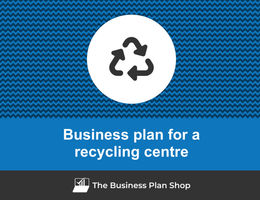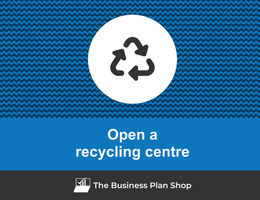How to create a financial forecast for a recycling centre?
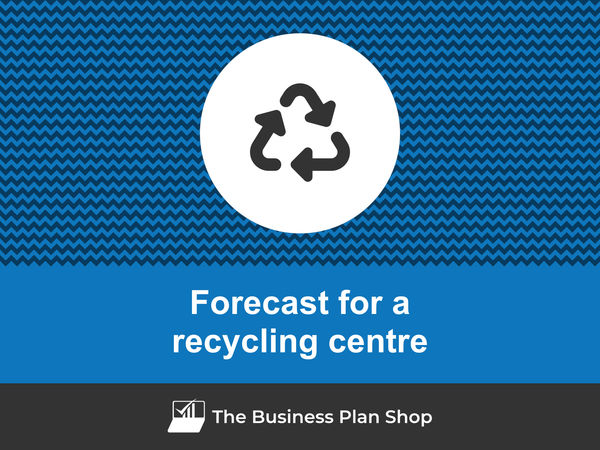
Creating a financial forecast for your recycling centre, and ensuring it stays up to date, is the only way to maintain visibility on future cash flows.
This might sound complex, but with the right guidance and tools, creating an accurate financial forecast for your recycling centre is not that hard.
In this guide, we'll cover everything from the main goal of a financial projection, the data you need as input, to the tables that compose it, and the tools that can help you build a forecast efficiently.
Without further ado, let us begin!
Why create and maintain a financial forecast for a recycling centre?
The financial projections for your recycling centre act as a financial blueprint to guide its growth with confidence and ensure its long-term financial viability.
To create them, you will need to look at your business in detail - from sales to operating costs and investments - to assess how much profit it can generate in the years to come and what will be the associated cash flows.
During challenging market conditions, maintaining an up-to-date financial forecast enables early detection of potential financial shortfalls, allowing for timely adjustments or securing financing before facing a cash crisis.
Your recycling centre's financial forecast will also prove invaluable when seeking financing. Banks and investors will undoubtedly request a thorough examination of your financial figures, making precision and presentation essential.
Need a convincing business plan?
The Business Plan Shop makes it easy to create a financial forecast to assess the potential profitability of your projects, and write a business plan that’ll wow investors.

What information is needed to build a recycling centre financial forecast?
The quality of your inputs is key when it comes to financial modelling: no matter how good the model is, if your inputs are off, so will the forecast.
If you are building a financial plan to start a recycling centre, you will need to have done your market research and have a clear picture of your sales and marketing strategies so that you can project revenues with confidence.
You will also need to have a clear idea of what resources will be required to operate the recycling centre on a daily basis, and to have done your research with regard to the equipment needed to launch your venture (see further down this guide).
If you are creating a financial forecast of an existing recycling centre, things are usually simpler as you will be able to use your historical accounting data as a budgeting base, and complement that with your team’s view on what lies ahead for the years to come.
Let's now zoom in on what will go in your recycling centre's financial forecast.
The sales forecast for a recycling centre
The sales forecast, also called topline projection, is normally where you will start when building your recycling centre financial forecast.
Creating a coherent sales projection boils down to estimating two key drivers:
- The average price
- The number of monthly transactions
To do this, you will need to rely on historical data (for an existing business), market research data (for both new and existing recycling centres), and consider the elements below:
- Location: The location of your recycling centre can greatly affect the average price and number of monthly transactions. If your centre is located in a densely populated area with a high demand for recycling services, you can charge higher prices and expect more transactions compared to a centre in a rural area with limited demand.
- Competition: The presence of other recycling centres in the same area can also impact your average price and number of monthly transactions. If there are many competitors offering similar services, you may need to adjust your prices to stay competitive and attract more customers.
- Economic conditions: The state of the economy can also influence your sales forecast. During times of economic downturn, people may be more likely to recycle in order to save money, leading to an increase in transactions. On the other hand, during periods of economic growth, people may be less concerned with saving money and therefore, your average price may decrease.
- Availability of materials: The availability of recyclable materials in your area can also impact your sales forecast. If there is a shortage of materials, you may see a decrease in transactions as people have less to recycle. On the other hand, if there is an abundance of materials, you may see an increase in transactions as people have more to recycle.
- Legislation and regulations: Changes in legislation and regulations related to recycling can also affect your business. For example, if new laws are passed that require stricter recycling practices, you may need to invest in new equipment or adjust your prices to comply, which can impact your average price and number of transactions.
After the sales forecast comes the operating expenses budget, which we will now look into in more detail.
Need a convincing business plan?
The Business Plan Shop makes it easy to create a financial forecast to assess the potential profitability of your projects, and write a business plan that’ll wow investors.

The operating expenses for a recycling centre
Once you know what level of sales you can expect, you can start budgeting the expenses required to operate your recycling centre on a daily basis.
Expenses normally vary based on how much revenue you anticipate (which is why, from experience, it is always better to start your forecast with the topline projection), and where your business is based.
Operating expenses for a recycling centre will include some of the following items:
- Staff Costs: This includes salaries, wages, benefits, and training for all employees working at the recycling centre.
- Accountancy Fees: You will need to hire an accountant or accounting firm to manage your financial records, prepare tax returns, and provide financial advice.
- Insurance Costs: It is important to have insurance coverage for your recycling centre to protect against potential risks such as property damage, theft, and liability.
- Software Licences: You will need to purchase software licences for programs that help manage operations, track inventory, and analyze data.
- Banking Fees: There will be fees associated with managing your banking transactions, such as wire transfers, check deposits, and account maintenance.
- Rent/Lease: If you do not own the building where the recycling centre is located, you will need to pay rent or lease fees.
- Utilities: You will need to pay for utilities such as electricity, water, and gas to keep the recycling centre running.
- Maintenance and Repairs: Regular maintenance and repairs are necessary to keep equipment and facilities in good working condition.
- Marketing and Advertising: You may need to invest in marketing and advertising to promote your recycling centre and attract customers.
- Transportation Costs: There will be costs associated with transporting materials to and from the recycling centre, such as fuel and vehicle maintenance.
- Safety and Security: It is important to prioritize safety and security at the recycling centre, which may require investments in equipment and training.
- Permits and Licences: You will need to obtain permits and licences from local authorities to operate the recycling centre.
- Waste Disposal Fees: Depending on the type of materials being recycled, you may need to pay fees for proper disposal of certain items.
- Office Supplies: You will need to purchase office supplies such as paper, ink, and pens to keep the recycling centre's administrative tasks running smoothly.
- Professional Services: You may need to hire outside professionals, such as lawyers or consultants, for specialized tasks or advice.
This list will need to be tailored to the specificities of your recycling centre, but should offer a good starting point for your budget.
What investments are needed to start or grow a recycling centre?
Once you have an idea of how much sales you could achieve and what it will cost to run your recycling centre, it is time to look into the equipment required to launch or expand the activity.
For a recycling centre, capital expenditures and initial working capital items could include:
- Land and Building Construction: This includes the cost of acquiring land, as well as the construction of the recycling centre's building. This can also include any necessary site preparations, such as excavation and grading.
- Machinery and Equipment: The purchase of machinery and equipment is essential for the operations of a recycling centre. This can include items such as balers, shredders, conveyors, and sorting machines.
- Vehicles: A recycling centre may require a fleet of vehicles for collecting and transporting recyclable materials. These can include trucks, vans, and forklifts.
- Waste Management System: In order to properly manage and process recyclable materials, a recycling centre may need to invest in a waste management system. This can include items such as bins, containers, and compactors.
- Office Equipment and Furniture: A recycling centre will also need to invest in basic office equipment and furniture, such as computers, printers, desks, and chairs.
Again, this list will need to be adjusted according to the specificities of your recycling centre.
Need a convincing business plan?
The Business Plan Shop makes it easy to create a financial forecast to assess the potential profitability of your projects, and write a business plan that’ll wow investors.

The financing plan of your recycling centre
The next step in the creation of your financial forecast for your recycling centre is to think about how you might finance your business.
You will have to assess how much capital will come from shareholders (equity) and how much can be secured through banks.
Bank loans will have to be modelled so that you can separate the interest expenses from the repayments of principal, and include all this data in your forecast.
Issuing share capital and obtaining a bank loan are two of the most common ways that entrepreneurs finance their businesses.
What tables compose the financial plan for a recycling centre?
Now let's have a look at the main output tables of your recycling centre's financial forecast.
The forecasted profit & loss statement
The profit & loss forecast gives you a clear picture of your business’ expected growth over the first three to five years, and whether it’s likely to be profitable or not.
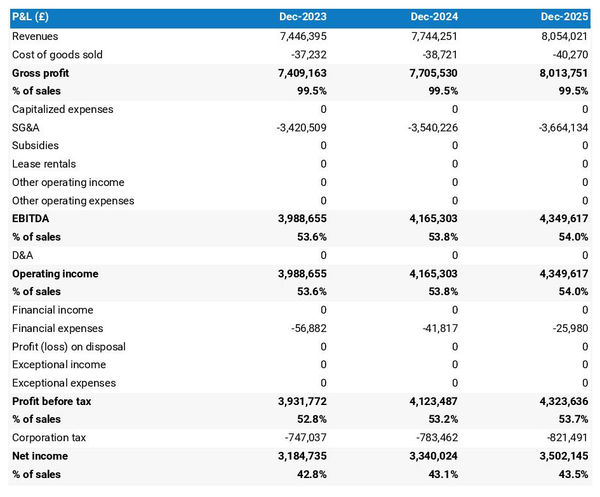
A healthy recycling centre's P&L statement should show:
- Sales growing at (minimum) or above (better) inflation
- Stable (minimum) or expanding (better) profit margins
- A healthy level of net profitability
This will of course depend on the stage of your business: numbers for an established recycling centre will look different than for a startup.
The projected balance sheet
The projected balance sheet gives an overview of your recycling centre's financial structure at the end of the financial year.
It is composed of three categories of items: assets, liabilities and equity:
- Assets: are what the business possesses and uses to produce cash flows. It includes resources such as cash, buildings, equipment, and accounts receivable (money owed by clients).
- Liabilities: are the debts of your recycling centre. They include accounts payable (money owed to suppliers), taxes due and bank loans.
- Equity: is the combination of what has been invested by the business owners and the cumulative profits to date (which are called retained earnings). Equity is a proxy for the value of the owner's stake in the business.
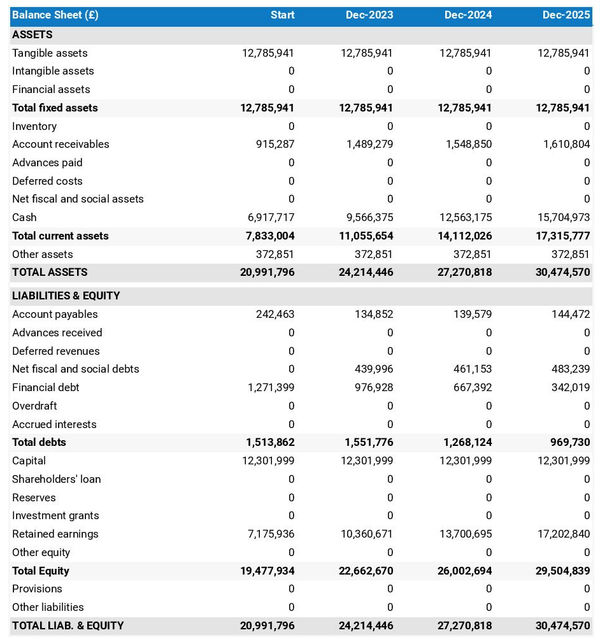
The cash flow projection
The cash flow forecast of your recycling centre will show how much cash the business is expected to generate or consume over the next three to five years.
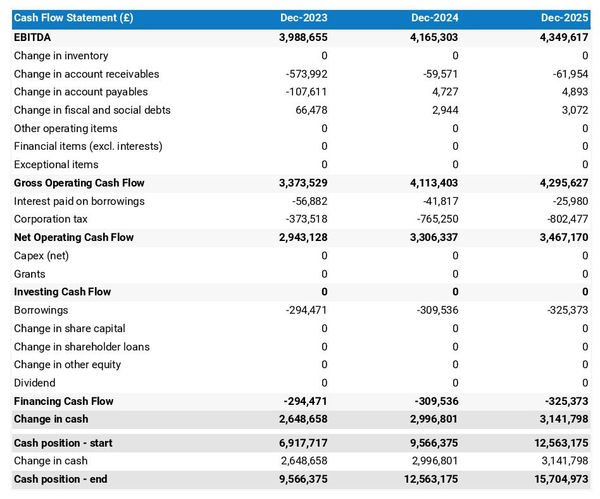
There are multiple ways of presenting a cash flow forecast but from experience, it is better to organise it by nature in order to clearly show these elements:
- Operating cash flow: how much cash is generated by the recycling centre's operations
- Investing cash flow: what is the business investing to expand or maintain its equipment
- Financing cash flow: is the business raising additional funds or repaying financiers (debt repayment, dividends)
Your cash flow forecast is the most important element of your overall financial projection and that’s where you should focus your attention to ensure that your recycling centre is adequately funded.
Note: if you are preparing a financial forecast in order to try to secure funding, you will need to include both a yearly and monthly cash flow forecast in your recycling centre's financial plan.
Need a convincing business plan?
The Business Plan Shop makes it easy to create a financial forecast to assess the potential profitability of your projects, and write a business plan that’ll wow investors.

Which tool should you use to create your recycling centre's financial forecast?
Using the right tool or solution will make the creation of your recycling centre's financial forecast much easier than it sounds. Let’s explore the main options.
Using online financial forecasting software to build your recycling centre's projections
The modern and easiest way is to use an online financial forecasting tool such as the one we offer at The Business Plan Shop.
There are several advantages to using specialised software:
- You can easily create your financial forecast by letting the software take care of the financial calculations for you without errors
- You have access to complete financial forecast templates
- You get a complete financial forecast ready to be sent to your bank or investors
- You can easily track your actual financial performance against your financial forecast, and recalibrate your forecast as the year goes by
- You can create scenarios to stress test your forecast's main assumptions
- You can easily update your forecast as time goes by to maintain visibility on future cash flows
- You have a friendly support team on standby to assist you when you are stuck
- It’s cost-efficient and much cheaper than using an accountant or consultant (see below)
If you are interested in this type of solution, you can try our projection software for free by signing up here.
Calling in a financial consultant or chartered accountant
Enlisting the help of a consultant or accountant is also a good way to obtain a professional recycling centre financial forecast.
The downside of this solution is its cost. From experience, obtaining a simple financial forecast over three years (including a balance sheet, income statement, and cash flow statement) is likely to cost a minimum of £700 or $1,000.
The indicative cost above, is for a small business, and a forecast is done as a one-shot exercise. Using a consultant or accountant to track your actuals vs. forecast and to keep your financial projections up to date on a monthly or quarterly basis will cost a lot more.
If you opt for this solution, make sure your accountant has in-depth knowledge of your industry, so that they may challenge your figures and offer insights (as opposed to just taking your assumptions at face value to create the forecast).
Why not use a spreadsheet such as Excel or Google Sheets to build your recycling centre's financial forecast?
You and your financial partners need numbers you can trust. Unless you have studied finance or accounting, creating a trustworthy and error-free recycling centre financial forecast on a spreadsheet is likely to prove challenging.
Financial modelling is very technical by nature and requires a solid grasp of accounting principles to be done without errors. This means that using spreadsheet software like Excel or Google Sheets to create accurate financial forecasts is out of reach for most business owners.
Creating forecasts in Excel is also inefficient nowadays:
- Software has advanced to the point where forecasting can be done much faster and more accurately than manually on a spreadsheet.
- With artificial intelligence, the software is capable of detecting mistakes and helping decision-making.
Spreadsheets are versatile tools but they are not tailor-made for reporting. Importing your recycling centre's accounting data in Excel to track actual vs. forecast is incredibly manual and tedious (and so is keeping forecasts up to date). It is much faster to use dedicated financial planning tools like The Business Plan Shop which are built specially for this.
Need a convincing business plan?
The Business Plan Shop makes it easy to create a financial forecast to assess the potential profitability of your projects, and write a business plan that’ll wow investors.

Use our financial projection templates for inspiration
The Business Plan Shop has dozens of financial forecast templates available.
Our examples contain a complete business plan with a financial forecast and a written presentation of the company, the team, the strategy, and the medium-term objectives.
Whether you are just starting out or already have your own recycling centre, looking at our financial forecast template is a good way to:
- Understand what a complete business plan should look like
- Understand how you should model financial items for your recycling centre
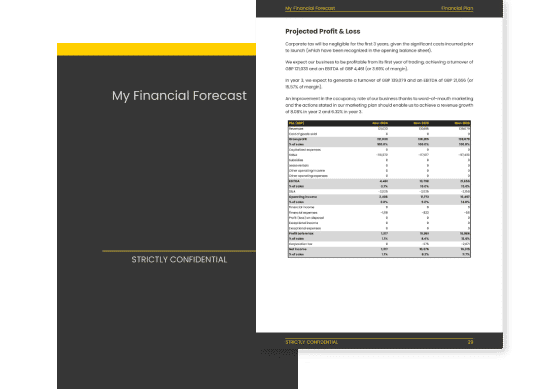
Takeaways
- A financial projection shows expected growth, profitability, and cash generation for your business over the next three to five years.
- Tracking actuals vs. forecast and keeping your financial forecast up-to-date is the only way to maintain visibility on future cash flows.
- Using financial forecasting software makes it easy to create and maintain up-to-date projections for your recycling centre.
You have reached the end of our guide. We hope you now have a better understanding of how to create a financial forecast for a recycling centre. Don't hesitate to contact our team if you have any questions or want to share your experience building forecasts!
Need a convincing business plan?
The Business Plan Shop makes it easy to create a financial forecast to assess the potential profitability of your projects, and write a business plan that’ll wow investors.

Also on The Business Plan Shop
- Example of financial projections
- How to write a business plan for a recycling centre
- How to project sales for a business?
- Financial forecast for a business idea
Know someone who runs or wants to start a recycling centre? Share our financial projection guide with them!


